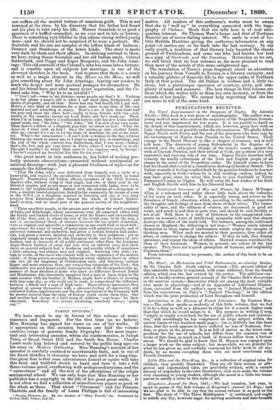FAMILY PIM ciii8."
We haTe much to say in favour of this volume of remi- niscences and fragments. For the first time (as we believe) Miss Manning has signed her name on one of her works. It is appropriate on this occasion because one half the volume contains scraps of genuine family biography. Her most impor- tant and interesting ancestor, whom she commemorates, is Joseph Paice, of Bread Street Hill and the South Sea House. Charles Lamb made him beloved and revered by the public long ago—ill his essay on Modern Gallantry. Miss Manning's account of her ancestor is carefully confined to ascertainable facts, and is one of the finest sketches of character we have met with for a long time. Our great fear is that some adventurous damsel or squire will take this faint and truthful sketch in hand and turn it into a full Three-volume novel, overflowing with archaic cockneyisms, and the " earnestness " and all the rest of the affectations of the religio sentimental school. We can only hope that Miss Manning or her publisher has a copyright in the life of her great great uncle: It is not often we find a collection of miscellaneous papers so good on the whole as these. That about " Claremont " and the Princess Charlotte and the family of Louis Philippe is full of interesting
• Family Pictures, 4.0. By the Author of "M517 Powell," Sze. Published by Arthur Hall, Virtue, and Co.
matter. All readers of this authoress's works must be aware that she is "well up" in everything connected with the topo- graphy of Chelsea. Much that she tells here is of real anti- quarian interest. Sir Thomas More's house and that of Hortense Mancini are of never-failing interest. We smile to read of Le- titia Matilda Hawkins giving the authoress information on any point—it carries one so far back into the last century. In our early youth, a tradition of that literary lady haunted the classic ground of Twickenham, and some one who had known her lent us a copy of Gertrude and the Countess. Heterodox as we are, we still think that its four volumes as far more pleasant to read than most of the novels of this more enlightened age. The translation of Tasso's prose fragment about an adventure on his journey from Vercelli to Novara is a literary curiosity, and a valuable picture of domestic life in the upper ranks of Northern Italy at that period. The old Italian is verbose and a little te- dious, but a picturesque specimen of courtesy, piety, and shn- plieity of mind and manners. The best things in this volume are those which the writer tells us from her own memory, or from the records of her family. We cannot help regretting that she has not more to tell of the same kind.


























 Previous page
Previous page